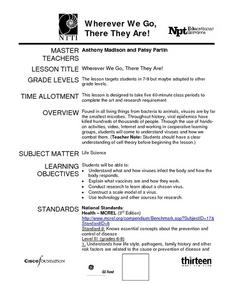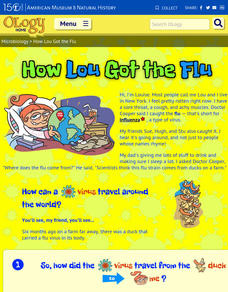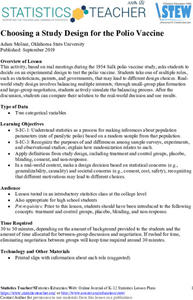Curated OER
AP: Chapter 18: Microbial Models
AP biology and college microbiology classes benefit by completing this seven-page worksheet on microbes. An exhaustive set of questions addresses the characteristics and reproduction of viruses, classification and uses of bacteria, and...
Center for Technology in Teaching and Learning
MedMyst Mission 1: Orientation at O.R.B.
A dozen years after a great plague wipes out the majority of Earth's civilization, a group of scientists joins together to fight infectious diseases. Scholars join the training mission and learn about viruses, bacteria, pathogens and...
Center for Technology in Teaching and Learning
MedMyst Mission 3: Nemesis at Neuropolis
Calling all science sleuths! A patient appears to have a disease eradicated years ago—how do you treat it? Scholars must research the illness, the possible causes, and find a cure before the disease spreads and wipes out the entire city....
Curated OER
TE Lesson: Fighting Back!
Students examine the roles of the immune system in keeping the body healthy. They see how engineers contribute to this process by creating antibiotics, and vaccinations. They discuss how an astronauts' immune system may be suppressed...
Curated OER
Requiring HPV vaccine
Students research the HPV vaccine and discover what it is supposed to do. In gropus, they consult with doctors and local health officials to discover the possible side effects of the vaccine and presents their findings to the class. They...
Curated OER
Sexually Transmissible Diseases (STDs), Day 4: Epidemiology
Sexually transmitted diseases (STDs) or infections (STIs) are totally preventable. Yet, the number of cases is on the rise. Why? This health lesson contains a lot of information about prevention, as well as a great activity about how...
Curated OER
Wherever We Go, There They Are!
The central video for this lesson is not available through the included resource link. However, the activity that simulates the passing of a virus through a population is impacting and the other resource links are invaluable. Use this...
Curated OER
Vaccines
Students explore and explain the role of vaccines in infectious disease, They emphasize immunological principles and viral/bacterial infection processes. Students explore the three main vaccine types: DNA vaccines ("gene gun"),...
Curated OER
"Cures" Chart
Students chart the "cures" for people with disabilities. In this disabilities instructional activity, students compare and contrast the care and treatment of people with disabilities in the past and present. Students write accurate...
Curated OER
The Immune System
Activate the immune system in the brains of your biologists! This worksheet calls upon learners to explain the structure, function, and problems associated with the immune system. This worksheet is helpful for the advanced placement...
Curated OER
Disease, Environment, Health, Human Populations, and Modern Technology
What is a pandemic, epidemic, and a vaccine? What changes have occurred in health and environmental awareness with the advent of new technology? This 20 question multiple choice quiz asks kids to answer who, what, when, and where about...
Ask A Biologist
Viral Attack
Can you catch the same cold twice? Elementary and middle schoolers learn about what happens when a virus attacks their bodies, and how the immune system never forgets a virus, with an entertaining comic book. The packet includes...
Centers for Disease Control and Prevention
Understanding the Epidemiologic Triangle through Infectious Disease
Introduce infectious diseases and the epidemiologic triangle. A helpful resource describes the agent, host, and environment from the three vertices as well as the time factor, which is in the middle. Scholars complete a simple...
Teach Engineering
Curb the Epidemic!
Class members use an applet on the Internet to simulate the spread of a disease. The simulation allows individuals to determine two nodes to vaccinate to limit the number of nodes infected. By running several simulations, scholars can...
Howard Hughes Medical Institute
Ebola: Disease Detectives
How did the Ebola virus first infect humans? Young virologists examine genetic sequences from the 2014 Sierra Leone outbreak to find similarities during a riveting activity. Following similar methods used by MIT and Harvard, partners...
Children’s Hospital of Philadelphia
Vaccine Safety
Enter the debate on vaccines. Small groups research topics related to vaccine safety in the last lesson in a unit of five. In the process of the research, team members learn how to determine the validity and credibility of a website. The...
Children’s Hospital of Philadelphia
Animal Research and Vaccines
Animals save lives. In small groups pupils research the role of animals in the development of vaccines. Each team investigates one disease to find out how the vaccine was developed and how animals played a role n the research. Groups...
Children’s Hospital of Philadelphia
Learning From Animals
Is all research on animals bad? Learners use a video to understand how animal research benefits humans. Pupils read about a drug modification turned deadly and the result of the 1938 Federal Food, Drug, and Cosmetic Act. Scholars use a...
Nemours KidsHealth
Colds and Flu: Grades 9-12
Flu fighters unite! To get the word out about the importance of getting vaccinated against the flu, groups create posters that persuade teens to get immunized. Also, scholars read articles about how to cope with colds, then create...
Nemours KidsHealth
Cold and Flu: Grades 6-8
Wouldn't it be lovely if people were immune from colds and flu? Alas, such is not the case; however, there are things we can do to avoid getting or spreading these pesky health hazards. Middle schoolers read articles that provide them...
American Museum of Natural History
How Lou Got the Flu
Six questions probe participants to discover the possibility of catching a virus from others—even animals. Here, the influenza virus travels from duck to person in a round-about way. The quiz concludes with helpful tips to stay healthy.
American Statistical Association
Choosing a Study Design for the Polio Vaccine
Be on the right side of history. Scholars first learn about polio and the meetings of the 1954 Salk polio vaccine study. In groups, they select roles, such as parents, government officials, and statisticians, and decide on the best...
PBS
Race and Vaccine Hesitancy in the US
What does race have to do with COVID vaccine hesitancy? That is the question young scholars pursue in a video lesson that looks at the impacts of such things as the Tuskegee Experiment, the unauthorized use of Henrietta Lacks's cancer...
Curated OER
Home Is Where the Hound Is
Students study Britain's rabies law then share their own personal pet stories with the class.
Other popular searches
- Animal Health Vaccinations
- Disease and Vaccinations
- Equine Vaccinations
- Childhood Vaccinations
- Health Vaccinations

























